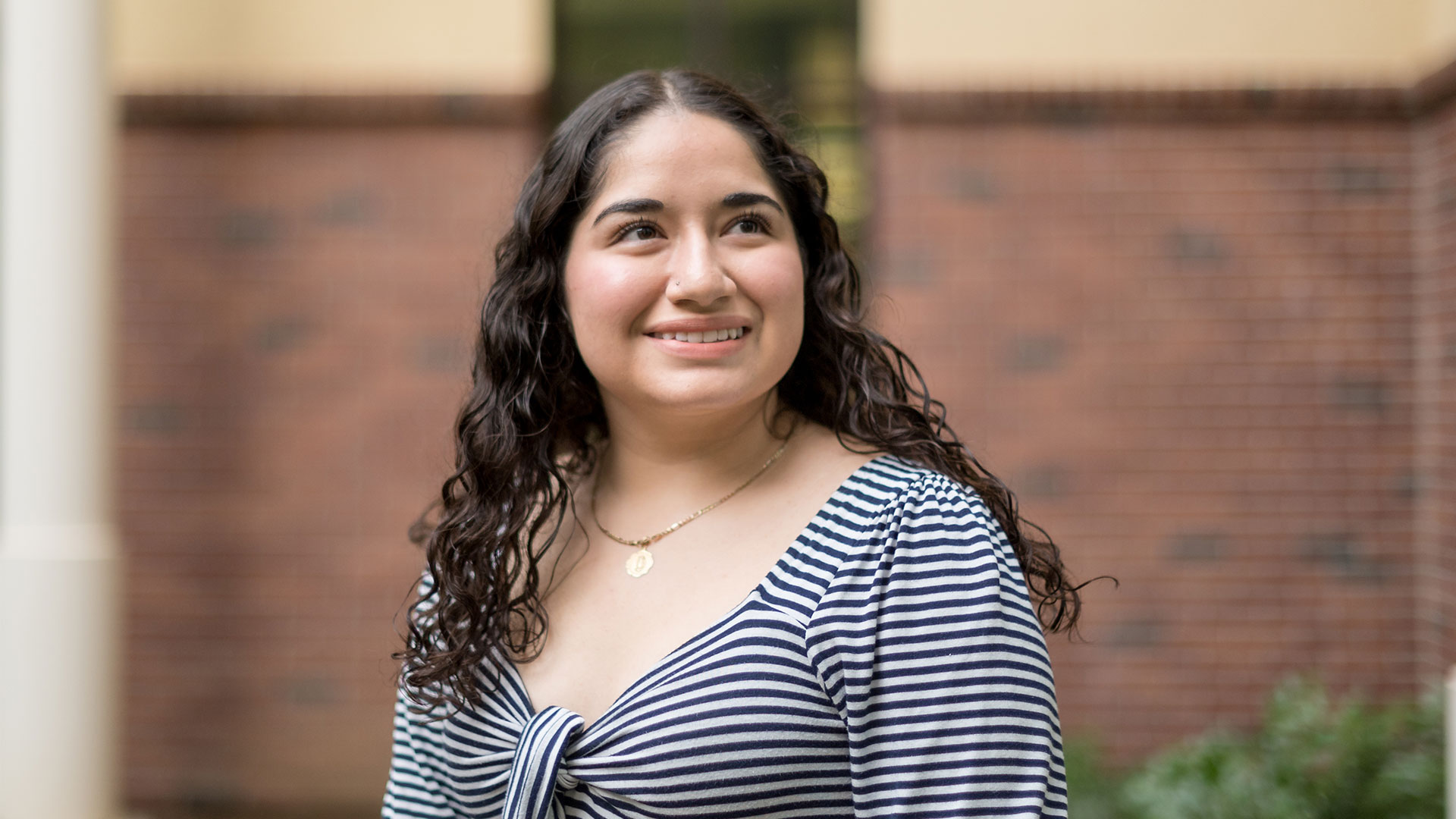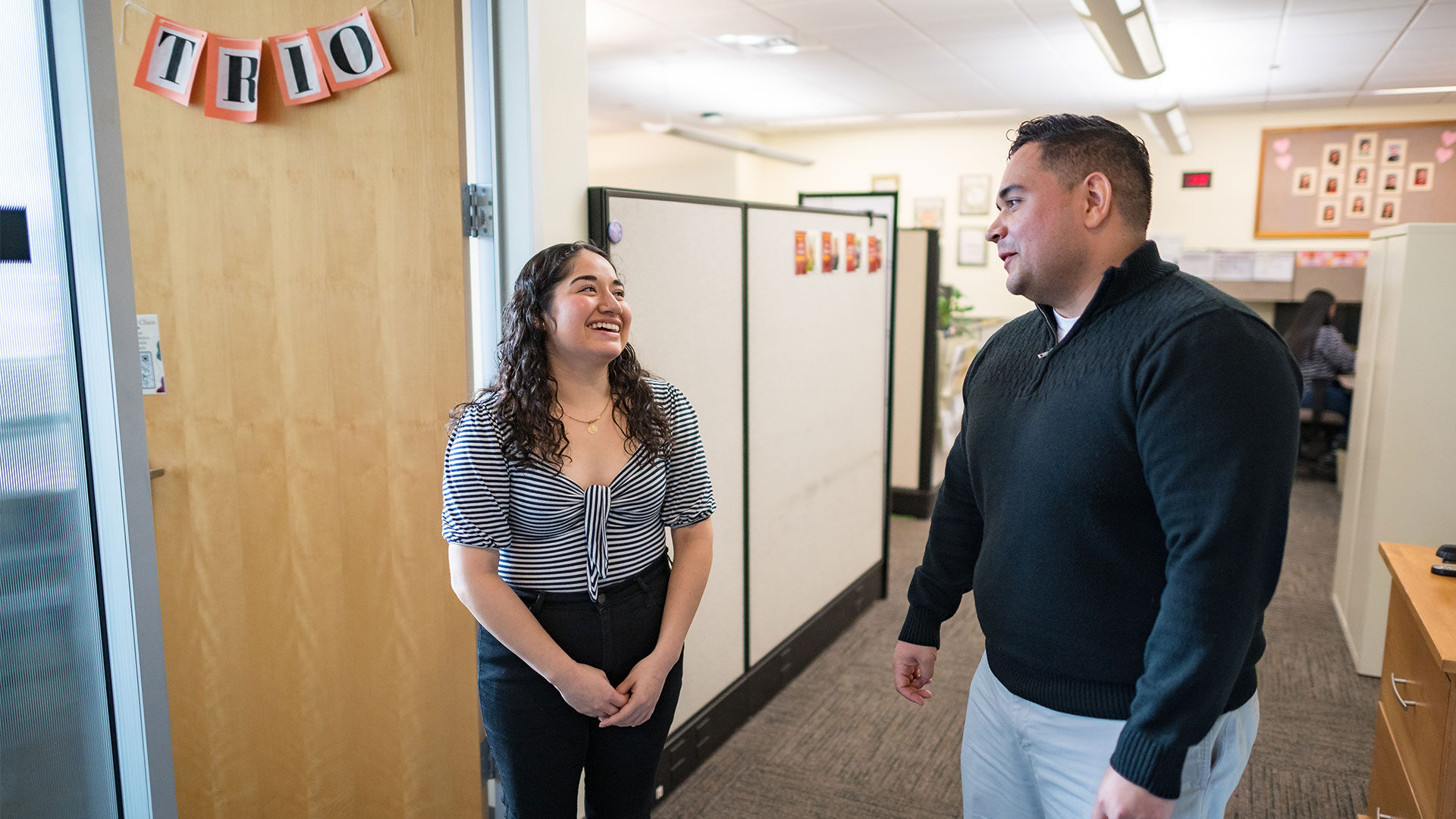Graduating Public Health Student Embraces Support and Grows Through Challenges

The daughter of immigrants and the oldest sibling in her family, Elizabeth “Eli” Contreras-Perez has carried adult responsibilities since childhood. Translating for her parents, driving her family to appointments, and helping care for her sisters were just a few of the duties that fell on her shoulders. By the time she was a senior in high school, college seemed like a distant possibility.
It took the nudge of a high school advisor to convince Contreras-Perez to apply to universities outside of her hometown of Merced.
“One of my curriculum advisors said, ‘You know, Eli, you can apply and go to college, right? There’s help, there’s scholarships,” said Contreras-Perez. “She really opened my eyes and helped me take the initiative.”
The initial draw to Chico State for Contreras-Perez was a program called TRIO Student Support Services. TRIO offers support to first-generation students throughout their college career. The program helped Contreras-Perez transition to Chico State and connected her with much-needed mentors and community. Joel Ramirez, TRIO Project Director, was one of those mentors and a former member of the program himself.
“I was lucky enough to meet Eli during her first semester at Chico State,” Ramirez said. “She’s an incredible student that would have been successful even without my support. She has an academic focus and personal drive that has allowed her to find success in all aspects of her life.”
For Contreras-Perez, finding that success was an uphill battle.
“When I was a senior in high school, my mom was diagnosed with a brain tumor,” Contreras-Perez said. “I remember being at work and getting a phone call from my dad letting me know he was at the hospital. It was a whole thing, because I take care of my family—helping translate papers, making appointments, taking care of my sisters—so I didn’t know who would schedule mom’s appointments and all that.”
Her mom assured her the best way to make an impact and help her family was to follow through on her plan to attend Chico State. Hesitantly, Contreras-Perez finalized plans to move north. She declared a major, helped her father map out directions to the college, and said goodbye to the only life she knew.
The challenges of college life hit her all at once. Contreras-Perez was struggling to adapt in a new city. She was struggling to make friends and was overwhelmed with staying connected to her community in Merced.
“When I got (to Chico State), I felt sad and homesick,” Contreras-Perez said. “It was very shocking coming to a college where you don’t see your people—my culture, I’m a Latina woman, so I just felt like an outsider.’”
As an academically driven person, she put all her energy into her classes, only to find that her decided major, nursing, wasn’t what she wanted to do in life. The pressure to pursue a degree in nursing came from her family back home.
“In my Hispanic culture, you watch Novellas and see a lot of nurses everywhere,” Contreras-Perez said. “My mom was like, ‘You need to be a nurse. This is how you can help people out.’”
Arguing over her future became a common occurrence when Contreras-Perez would call home. After a while, she reached her breaking point and knew she needed to make a tough choice about her future.
“There was a time where I felt lost and didn’t really have motivation to take classes anymore,” Contreras-Perez said.
One of the student coordinators in the TRIO program encouraged Contreras-Perez to try therapy—something that was never supported in her community back home.
“I come from a culture where it’s like, ‘what do you mean you’re talking about your feelings?’ It’s not something that we practice,” she said.

With time in therapy, Contreras-Perez felt confident enough to start making her own choices. She reached another turning point during a trip to Europe, when she visited a friend who was studying abroad in Italy.
“After Italy, I knew I wanted to do public health,” she said. “I learned a lot about how different the culture is and how (in Italy) people have different beliefs about nutrition. Their foods are so different. Farmers markets are really known over there—I saw people exercising all the time, walking to places—it just kind of opened my eyes.”
Time in Italy also helped her start rebuilding her life and pursue her own future.
“It was a time for me where I emerged into adulthood and I did things for myself,” she said.
As she started to make her own decisions, her appreciation for her family and culture grew. Through therapy, she was encouraged to empathize with her parents and learn more about their past to understand their behaviors.
“I think we both learned that I was trying to adapt to the American culture and keep my Mexican culture and that’s what kind of made us different in some way,” she said. “(My mom) was just trying to make sure I didn’t forget about her. I think her biggest concern was she probably was afraid that I was going to forget where I came from.”
Switching majors and learning about public health made her even more determined to learn about her home and her culture.
“Public health helped me understand more about my family back in Merced,” she said. “I didn’t know how your zip code really determines how long you live, if you have access to health care, if you have access to healthy foods. So, I searched my zip code from back home and found it is one of the poorest sites—public health really touched upon helping my people and it really made me feel like I can do something for my community.”
Looking back on her college career, Contreras-Perez can see how much she grew as a person and how much the experience helped shape her.
“A lot of students, when they come to college, they forget their motivator factor,” she said. “We get so busy with life, homework, school, we tend to forget why we’re here.”
With every challenge, she had to remind herself why she wanted to come to college in the first place—to gain perspective, to learn new things, to grow, and to give back.
As one chapter closes, she encourages incoming students to keep pushing forward, even when college or life becomes difficult.
“Challenges can be very stressful and stuff, but they really do help us grow,” she said. “We will look back at these challenges a year from now and probably be like, ‘No way this happened to me. I did that.’ So, when you’re in the moment, really try to be okay with the discomfort—make it a learning experience.”
For students struggling to find hope or an anchor, she encourages them to find someone to connect with.
“If they can just connect to one thing and find that one support system, they will be more likely to stay, and I think that’s what helped me. They’re not alone,” she said. “Get involved in something—a volunteer organization or event. It really helps you meet new people, learn through the experiences, and just kind of like, gives you a purpose.”
After graduation, Contreras-Perez plans to pursue a master’s degree and continue learning how she can give back to her community. With fresh perspective and newfound resilience, she is more determined than ever to keep pushing forward. Her relationship with her family continues to improve, and she even helped her mom achieve her own life goal: to own more chickens.


